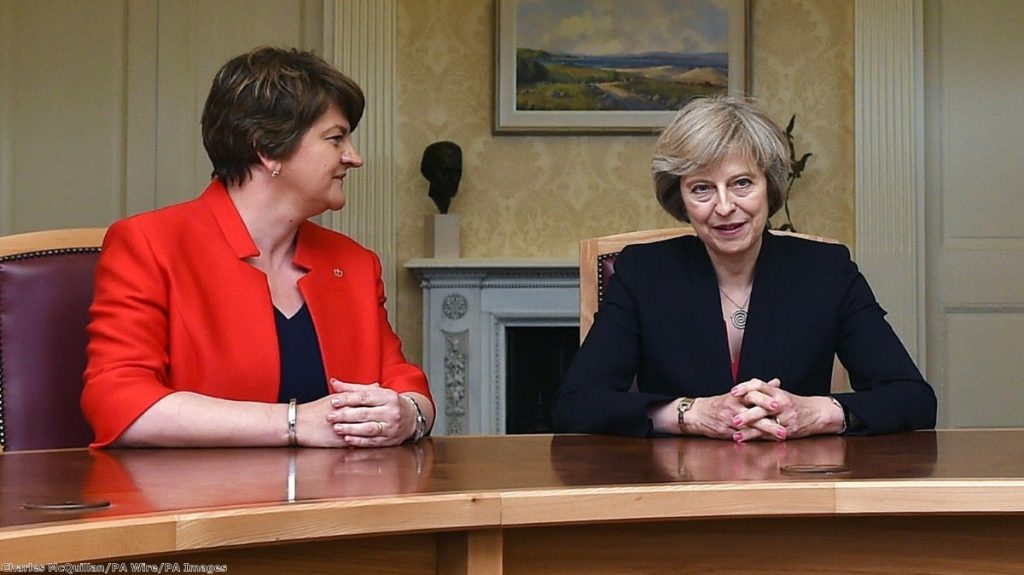By Kevin Meagher
We all thought the 13-month stalemate in Northern Ireland was coming to an end last Monday.
That's what happens when the British prime minister is put on a chartered plane and dispatched to Belfast for the obligatory photo-op to welcome – we assumed – a testy rapprochement between the DUP and Sinn Fein and the resumption for what passes as normal service in Northern Ireland.
Only nothing happened.


Theresa May came back with the political settlement still broken, despite talk about "small gaps" remaining. For good measure, Arlene Foster, leader of the Democratic Unionists, dismissed the prime minister’s intervention as "a distraction".
Despite Foster's characteristic gracelessness, she perhaps had a point. May has made one tactical error after another when it comes to handling Northern Ireland. Three, to be precise.
First, she left it to the Northern Ireland Office (NIO) to get things back on an even keel. Plainly, they haven't succeeded in doing so. Indeed, it was remiss of everyone around her – the NIO and Downing Street – to send her and the Irish Taoiseach, Leo Varadkar, on a fool's errand welcoming a deal that had not been concluded.
Her in-tray may well be overflowing with Brexit-related angst, but the prime minister should have critically engaged with the underlying problems in Northern Ireland ahead of last week. Especially given the key issues are so well known.
Sinn Fein's demand for a "rights-based society" including provision for legislation enshrining the Irish language (one of the oldest vernacular languages in the world) is hard to argue with. Unless, of course, you are the cuddly DUP.
Any attempt to 'Irishise' Northern Ireland, as they see it, is anathema. This is a party, in case anyone has forgotten, that fought tooth and nail against the signing of the Good Friday Agreement back in 1998. 'Catholic-nationalists should know their place' remains their wretched default setting.
May's 'hands off' approach echoes that of her predecessor. David Cameron left his Northern Ireland secretaries to run the show, cutting off regular contact with leading players on the ground. The net result is that problems that might be resolved are allowed to gestate into crises.
The prime minister is set to hold discussions with Sinn Fein's leadership this week. It would have been smarter to have done so earlier. She could have catalysed a process that has lacked forward propulsion and listed for months.
Second, she should have appointed a strong independent figure to chair the various talks that have taken place throughout 2017, aimed at reviving the collapsed executive. The Tories' arrangement with the DUP meant this was absolutely essential. Whichever way you cut it, you cannot be seen to be an impartial arbiter of cross party talks when you are so plainly beholden to one side, as the Tories are to the DUP. A respected international figure is needed to kick start talks.
She also needs a better Northern Ireland secretary. The aptly-named James Brokenshire was rated by no-one. His failure either to prevent the collapse of power-sharing or to revive it showed he simply lacked the political acuity for the role. From early reports, Karen Bradley, another factotum of May from her time as home secretary is, if anything, even more politically limited. (She reports to MPs tomorrow on likely next steps).
The problem with the role is that no-one much wants it. In Westminster terms, it's seen as a political backwater, yet it's all about dealing with raw politics, requiring imagination and dexterity. During the New Labour years, a procession of the government's rising stars passed through the NIO.

Mandelson, John Reid and Peter Hain were big beasts of the Blair-Brown cabinets, while Paul Murphy and Shaun Woodward were effective negotiators and nimble tacticians. Rather than put no-hopers into the role, May could have appointed from among her more able middle-ranking ministers.
Her third mistake was to assume that just because the two sides disagree about something fundamental, it means that a reasonable position must be equidistant. The implementation of an Irish language act – the major sticking point – is manifestly a reasonable measure.
There isn't a single respectable argument against having one. Scotland and Wales both do and, not to labour the point, Northern Ireland is, ultimately, Irish. The DUP's opposition is nothing more than naked sectarian antipathy.
Moreover, the outline of a package was clearly in place last week. There would have been acts for both Irish and Ulster-Scots and other legislation on diversity. It was a 'something for something' deal for all sides. Sinn Fein would have walked away with the Irish language given equal status with English, but the extra bills could have muddied the waters enough for the DUP to claim they had put Ulster-Scots culture on the same level.
Arlene Foster clearly couldn't sell this limited concession to her grumbling grassroots. Unionism always needs encouragement to move beyond its sectarian boundaries and rise to the occasion. The priority should have been to prevent her getting boxed-in to a tight corner and instead support her with the choreography of selling the deal. It didn't happen.
This year is the 50th anniversary of the Northern Ireland civil rights movement, where nationalists took to the streets to challenge decades of sectarian control by unionists. A new confident generation that has grown up during the peace process simply isn't going to let dinosaurs roam the earth any longer.
So the risk now is that attitudes harden and even getting to the point of an outline deal becomes difficult to achieve. There's a lot of blame flying around in Belfast for last week's failure, but a good deal of it should be directed straight to Downing Street.
Kevin Meagher is author of ‘A United Ireland: Why unification is inevitable and how it will come about,’ published by Biteback
The opinions in politics.co.uk's Comment and Analysis section are those of the author and are no reflection of the views of the website or its owners.












